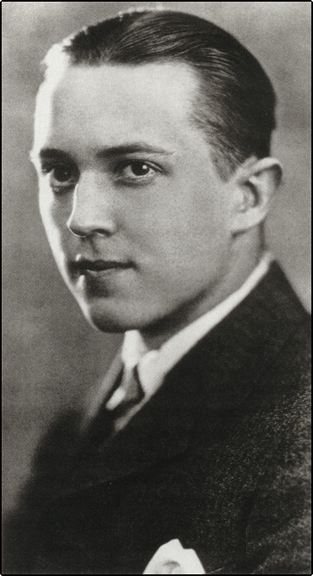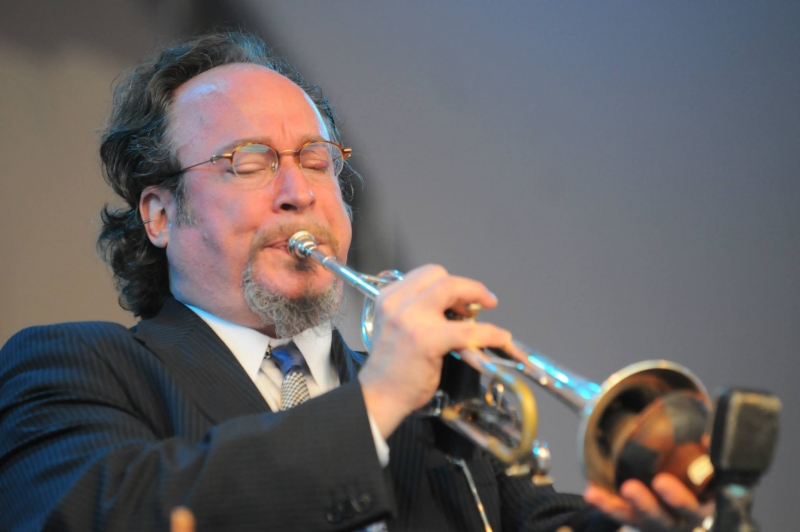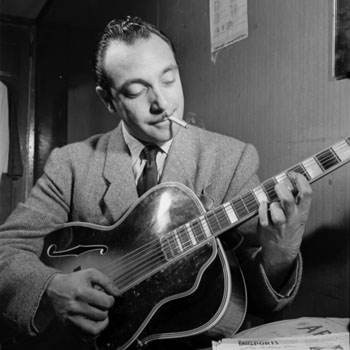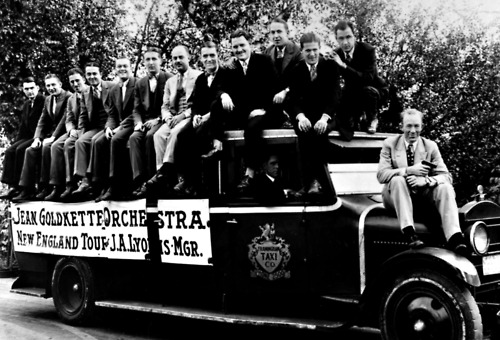
Portrait of Bix Beiderbecke. Photo in public domain.
Recorded live at the Crest Theatre at the Sacramento Jazz Jubilee on a hot and sunny Memorial Day Weekend in 1999, this edition of Riverwalk Jazz celebrates three towering figures in jazz—Bix, Django & Satchmo.
Bix Beiderbecke was a dreamy, middleclass kid from Davenport, Iowa who carried his cornet around in an old paper bag. Bix was not much to look at until he put his horn to his lips. Guitarist Eddie Condon likened the appeal of Beiderbecke’s playing to the sound of a girl saying ‘yes.’ On stage, Beiderbecke produced a hot jazz sound that had flappers and their raccoon-coated boyfriends crowding the bandstand egging him on. French Guitarist Django Reinhardt, dubbed the ‘King of Gypsy Swing,’ wowed audiences in the 30s, when he teamed up with jazz violinist Stéphane Grappelli in the Quintette du Hot Club de France. Louis ‘Satchmo’ Armstrong is the consummate artist in our triple crown of jazz pioneers. Armstrong learned to play a battered horn in a New Orleans orphanage and went on to become the most influential jazz trumpeter of the 20th century.
First off, New York-based trumpeter Jon-Erik Kellso joins The Jim Cullum Jazz Band onstage at the Crest for three tunes associated with jazz legend Louis Armstrong. Kellso is among today’s hottest and most sought-after trumpeters playing in the pre-WWII style. A member of Vince Giordano’s Nighthawks, Kellso is regularly heard on the HBO TV series Boardwalk Empire; and, he’s an Arbors recording artist, performing at festivals, concerts and jazz parties in the US and abroad in Europe and Japan.

Jon-Erik Kellso. Photo courtesy of the artist.
Louis Armstrong composed “Struttin' with Some Barbecue“ with his wife Lil Hardin Armstrong. “Of All the Wrongs You've Done to Me“ is from a series of 1924 recording sessions organized by Clarence Williams under the name Red Onion Jazz Babies, a group featuring Armstrong on trumpet and another New Orleans jazz giant saxophonist Sidney Bechet, with Lil Hardin on piano, among others. Here, Kellso gets a chance to show off his plunger mute technique, which lends a haunting vocal quality to his trumpet sound reminiscent of pioneering bandleader King Oliver. “I Wish I Could Shimmy Like my Sister Kate“ had its origins in the rough-hewn, bawdy music culture of New Orleans’ red-light district Storyville, which served as an incubator for many early jazzmen—including Armstrong.

Django Reinhardt. Photo in public domain.
Guitarist Django Reinhardt combined the music of his Romani heritage with American jazz to create a hot, driving sound with a distinctly European flavor. In the early 1930s he collaborated with jazz violinist Stéphane Grappelli to form the Quintet of the Hot Club of France. The instrumentation of their band was unusual for jazz of the time. Instead of horns and percussion, the Quintet had three guitars, a violin and a string bass. It’s widely acknowledged today that the recorded output of this group of European jazz artists proves it to be, as one critic wrote, “one of the most original bands in the history of recorded jazz.”
San Francisco guitarist Paul Mehling has been fascinated with the genius of Reinhardt and Grappelli his entire professional life. With his group the Hot Club of San Francisco, Mehling revives the sound of the original Hot Club of France. Here, Mehling and company performs two well-known works from the “Jazz Manouche” canon: “Pêche à la Mouche“ and “Swing 39,“ plus a Mehling original squarely within the style, “Don't Panic.“ Accompanying Mehling in the Hot Club is violinist Jenny Scheinman, Michael Groh and Sylvia Herold on guitars and John Clark on bass.
The musical genius of cornetist and pianist Bix Beiderbecke has found adherents in every generation of jazz musicians and enthusiasts to the present moment. The audience at the Crest was thrilled to meet the nonagenarian trombonist Spiegle Willcox when he made a special appearance onstage.

Willcox (second from left) and Bix (fourth from left) on tour with the Goldkette Band, 1927. Photo courtesy of bixography.
A band mate with Bix Beiderbecke in the Jean Goldkette Orchestra from 1926-27, Spiegle added his praise of the cornet legend in this broadcast interview, saying, “I was honored to play with Bix for nine months out of his short life.” Spiegle sits in with Jim and the Band on “I'll Be A Friend with Pleasure,“ a tune from 1930 thought to be one of the last Bix ever recorded. Willcox passed away at the age of 96, some months after this radio appearance.
The Jim Cullum Jazz Band plays two more tunes associated with the playing of Bix Beiderbecke in the 1920s: “Rhythm King“ from 1928 and “Oh Baby (Don't Say No, Say Maybe)“ which Bix recorded with the Wolverine Orchestra in 1925.
Photo credit for Home Page: Jon-Erik Kellso. Photo by Lynn Redmile.
Text based on Riverwalk Jazz script by Margaret Moos Pick ©1999

